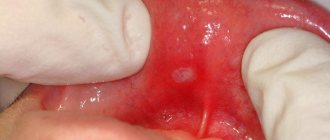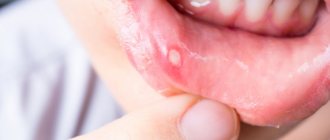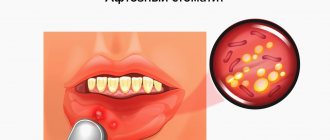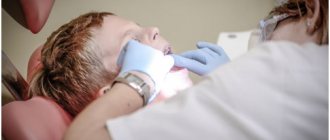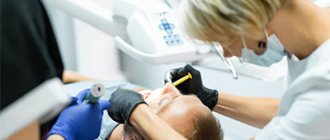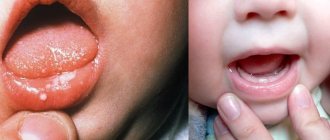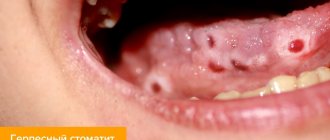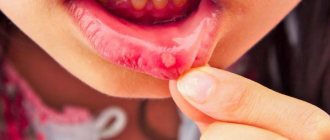Aphthous stomatitis is an acute inflammation of the oral mucosa with the formation of painful erosions (aphthous). Small round ulcers form on the inside of the lips, cheeks, tongue, tonsils, cause constant pain and affect overall well-being. Stomatitis is caused by a viral or bacterial infection, microtrauma of the mouth. But most often the disease develops against the background of stress or a decrease in the body’s defenses.
Causes of aphthous stomatitis
The exact cause of this disease remains unclear. It is assumed that HRAS is of an allergic nature; allergens can include: food, medicine, toothpastes, dust, worms.6,7 It is also assumed that the cause of the disease is an autoimmune reaction.8 A hereditary predisposition to this disease can be traced.
Predisposing factors:
- diseases of the digestive system (gastritis, gastric ulcer, cholecystitis, Crohn's disease)
- dysbacteriosis
- stress
- deficiency of iron, vitamins B1, B2, B6, B12, C
- chronic tonsillitis, otitis and rhinitis
Forms of the disease
Aphthous stomatitis can occur in two forms: chronic and acute. Each form of pathology has its own characteristics of symptoms, which help establish the clinical picture during diagnosis.
Acute form of aphthous stomatitis
The pathological condition is accompanied by puffiness and swelling of the mucous membrane, on which aphthae of gray or white color and round shape are formed. With timely initiation of treatment, acute stomatitis lasts up to 10 days. After therapy, the mucous membrane is completely restored.
Chronic form of aphthous stomatitis
It develops in the absence of treatment for acute stomatitis, hereditary predisposition or the presence of chronic diseases that affect the immune system. The peculiarity of the pathology is the occurrence of periodic relapses. The duration of the disease is up to 14–30 days.
HRAS classification:
| CAUSES | A COMMENT | ||
| causes: | Clinically, several forms of HRAS are distinguished: | a comment: | 1) fibrinous form: the size of aphthae is 2-3 mm, heal in 6-8 days 2) small canker sores (Mikulich’s aphthae): the size of aphthae is up to 1 cm, heal in 10-14 days 3) large Setton’s aphthae: the size of aphthae is from 1 to 3 cm, heal for a very long time, up to several months, leaving scars 4) herpetiform type: the smallest aphthae that merge |
| causes: | HRAS as a symptom of the disease: | a comment: | 1) Behcet's disease 2) Reiter's disease |
| causes: | According to severity, HRAS is divided into: | a comment: | 1) mild form: 1-2 aphthae, once every 2 years 2) moderate form: 3-6 aphthae, relapse 2 times a year 3) severe form: more than 6 aphthae, relapse several times a year |
Treatment at home and folk remedies
As an addition to the main therapy, it is possible to use folk remedies. Ginseng, propolis and echinacea are considered good immunomodulators. Infusions of chamomile, propolis or oak bark help cope with inflammation; aloe and sea buckthorn oil promote healing of aphthae. In any case, it is unlikely that you will be able to get rid of the disease using folk remedies alone, so do not delay in visiting a doctor. Timely therapy helps cure aphthous stomatitis and eliminate its symptoms within two weeks. Advanced stages are much more difficult to respond to and can cause irreversible deformation of soft tissues.
Attention!
Conservative therapy implies the possibility of treatment at home, but a visit to a doctor is still necessary, since only a specialist can draw up an optimal rehabilitation plan (including prescribing an ointment, solution, antibiotics, anti-inflammatory drugs, etc.) and track intermediate results.
HRAS as a symptom of the disease
Behçet's disease is a disease of unknown etiology, characterized by vascular damage, the appearance of aphthae in the oral cavity and genitals, damage to the eyes, joints, gastrointestinal tract, central nervous system and other organs. It has a chronic course and, if left untreated, can lead to disability.9
Symptoms:
HRAS
HRAS is the earliest symptom of the disease; aphthae can be of any size, recur at least 3 times a year, and are often located on the mucous membrane of the cheeks, lips, gums, tongue
Eye damage
Uveitis (inflammation of the membrane of the eye), blurred vision, “fog” before the eyes, redness of the eyes (rarely), lacrimation
Genital ulcers
Similar to mouth ulcers, but deeper and more painful
Skin redness
The skin exhibits erythema nodosum (red, painful subcutaneous nodules), rash
Other
- vessels in the form of thrombosis, aneurysms
- Nervous system damage: coma, meningitis, confusion
- joints may also be affected in the form of arthritis
Reiter's disease is a systemic infectious disease characterized by damage to the oral mucosa, genitourinary system, eyes and joints.10 The triggering factor for infection is often chlamydia and gonococci, and there is also a genetic predisposition. The disease has a severe course, and in case of complications it leads to disability (blindness, deforming arthritis) and even death.
It is important to remember that HRAS may indicate the presence of a serious systemic disease.
Diagnostic features
At the initial appointment, the dentist examines the oral cavity and analyzes complaints. To make an accurate diagnosis, you need to distinguish this form of the disease from others, as well as differentiate it from other pathologies that have similar symptoms. For extensive lesions, different diagnostic methods may be used:
- clinical blood tests;
- microflora smear;
- blood for PCR to determine the causative agent of the disease;
- biopsy (if indicated).
They are also necessary for recurrent forms of the disease. In simple cases, laboratory diagnostics are not required; aphthae are determined visually by an experienced specialist.
With the help of a comprehensive examination, the doctor will determine which microorganism caused inflammation with subsequent ulceration of the mucous membrane. He also differentiates the disease from herpetic stomatitis and oncological pathology.
Prevention of HRAS
Prevention should be aimed at monitoring the state of health in general, treating chronic diseases, and it is necessary to undergo regular examinations regarding the existing disease. Hardening and strengthening the immune system have a good effect. You need to visit the dentist to monitor your oral health once every 3-4 months to ensure timely detection of relapses. You should avoid using toothpastes, hygiene products with dyes or identified allergens. Taking antibiotics should only be done under the supervision of a doctor. It is recommended to avoid strong psycho-emotional stress and regularly carry out wet cleaning of the premises.
It is worth paying attention to Tantum® Propolis .
Tantum® Propolis
Propolis has an immunostimulating effect, promotes healing, vitamin C, which is part of it, is responsible for regeneration, participating in the synthesis of collagen.
Propolis also has antiviral and antifungal effects. Therefore, vitamin therapy Tantum® Propolis is an effective means of preventing stomatitis12 Find out more
Additional recommendations –
As soon as you notice the appearance of ulcers due to aphthous stomatitis, immediately start taking an antihistamine (anti-allergy) drug, plus eliminate from your diet all the foods and drinks that we described above. Immediately begin local therapy, which includes antiseptic rinses, anti-inflammatory gel + bismuth-based product to protect the surface of the ulcers from irritants. See if your toothpaste contains sodium lauryl sulfate or parabens, and if so, it is worth purchasing a toothpaste without these ingredients.
If brushing your teeth causes pain, then buy a soft toothbrush (they are usually used for inflammation and bleeding gums). For adults and children with constantly recurring outbreaks of aphthous stomatitis, there is an excellent preventive remedy - toothpastes with licorice extract and a whole complex of lactic enzymes. These components increase the protective factors of the oral mucosa, preventing the development of new cases of aphthous stomatitis.
Additional laboratory tests - with frequent, recurring outbreaks, a complete blood count should be performed to rule out hematological diseases. It is important to check blood plasma immunoglobulins and the number of lymphocytes, and take a test for HIV infection. To exclude autoimmune diseases, the patient is usually referred for the following tests:
- erythrocyte sedimentation rate,
- antinuclear antibodies and antineutrophil cytoplasmic antibodies,
- IgA-antiendomysial antibodies,
- antibodies to tissue transglutaminase.
If ulcerative lesions heal very poorly, take a long time and practically do not respond to local treatment, it is necessary to refer the patient for a biopsy to exclude granulomatous conditions such as orofacial granulomatosis, tuberculosis or malignant tumors.
Calling a doctor to your home –
If your child has stomatitis, it is very important to correctly determine its shape. Usually this is either an aphthous or herpetic form of stomatitis, and the most important thing is that they are treated completely differently. If your child develops stomatitis, you should not call the pediatrician. These specialists usually do not even know that there are several forms of stomatitis, and many of them still recommend treating them with brown, blue or Metrogil-dent gel. Or they prescribe a whole bunch of drugs with opposite effects - as if “at once for everything.”
It makes sense to contact a pediatrician only if the child’s general condition is severe, i.e. symptoms of intoxication (high temperature, dehydration...), but such symptoms are characteristic not of aphthous stomatitis, but of primary acute herpetic stomatitis. Therefore, it is optimal to contact a pediatric dentist, and you can always arrange a house call at the reception of a pediatric dental clinic. We hope that our review “Aphthous stomatitis: treatment in adults and children” was useful to you!
Sources:
1. Dental education of the author of the article, 2. National Library of Medicine (USA), 3. Textbook “Pediatric Dentistry” (Kolesov A.A.).4. “Pediatric therapeutic dentistry. National leadership" (Leontyev V.K.). 5. “Clinical recommendations (treatment protocol) for chronic recurrent aphthous stomatitis” (Volkov E.A., Butova V.G.).
What predisposes to recurrent oral aphthae?
Perhaps the microflora of the oral cavity, herpes group viruses, and maybe Helicobacter pylori, a microorganism that causes stomach and duodenal ulcers, play some role.
Also influence:
- injuries to the oral mucosa
- stress
- deficiency of vitamins B12, B1
- vitamin D deficiency
- zinc deficiency
- poor oral hygiene
- nitrates in drinking water
- Sodium lauryl sulfate is a very popular surfactant in the industry, which is often added to toothpastes for better cleaning and foaming effect.
- food allergies (eg, cow's milk protein) or food hypersensitivity (cinnamon, coffee, chocolate, cheese, figs, pineapple, citrus fruits, some spices)
- non-steroidal anti-inflammatory drugs
It is very important to understand: recurrent aphthae is an independent disease (most often this happens) or a manifestation of some systemic disease.
The latter option is rare, but the doctor should always keep in mind the possibility of this situation.
Conclusions:
Aphthae in the mouth recur at some point in life in almost 20% of all people, most often in the second decade of life.
It is difficult to establish a clear and unambiguous reason.
If recurrent aphthae occurs, the pediatrician, physician, or dentist should consider the possibility that rare aphthae are a manifestation of a serious systemic disease.
In such situations, the gastroenterologist must exclude celiac disease, Crohn's disease and ulcerative colitis.
5, total, today
